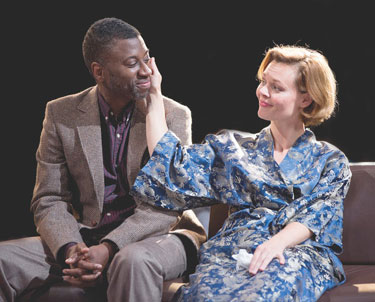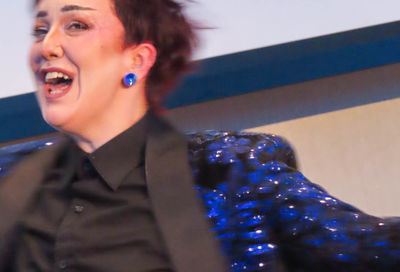Sensually Cerebral
Rarified, unapologetically wedded to the world of ideas and the process of seeking truth, The Real Thing is Tom Stoppard on love
One of the things that separate playwright Tom Stoppard from the herd is his near ruthless assumption of his audience’s intelligence, his plays racing with thoughts and ideas that wait for no man. For those starved for such challenges, his plays are like sex for the brain — tangos in which the experience is not passive but active. To see The Real Thing is to go synapse-to-synapse or risk missing out on the intellectual ecstasies that lay beneath the witty and engaging merry-go-round of love affairs that make up its plot.
Of course, you don’t have to. It is quite possible to enjoy The Real Thing at face value. It’s just that once you realize what Stoppard is after, it’s almost impossible not to – as one character does – pick up the Rubik’s Cube. For when Henry, a playwright imbued with Stoppard-like sensibilities and a similarly complex love life, speaks, he is simultaneously protagonist and agent provocateur positing and injecting content at warp speed. And one soon realizes that his (Stoppard’s) ideas exist in a meta world in which each idea – whether it contemplates the ever-collapsible tent of fidelity, language and its value, activism, sexism or the price of love – changes depending on the angle at which its viewed. Stoppard turns the pieces of the cube and literal turns to ironical, ironical to depthless, depthless to mirrored – and all remains somehow connected.

Real Thing
(Photo by Scott Suchman)
Thus, Henry and his pontifications dominate the play, both as hub in a wheel of relationships and as idea man. He is, by virtue of this heavy load, and despite Stoppard’s realism, a larger-than-life proxy. Abundantly energetic, Teagle F. Bougere is utterly convincing charismatically and intellectually, while not at all culturally. Showing no overt signs of being adapted for an American audience, this play drips with English reference, not just in language and events, but in ”types.” But as tremendous as he is standing alone, Bougere never quite captures the Englishman that Henry is. This is not because Bougere, an African-American, is in a role traditionally assumed white, it’s simply that he does not suggest in accent, cadence or demeanor a lifetime in Old Blighty – either as an educated white or black man. This choice starts with director David Muse who sees this Henry as affable, forbearing, almost insuppressible. But this kind of magnanimousness does not ring true — at the risk of making a wild generalization, men of Henry’s ilk usually have an edge, an arrogance, a skeptical certainty, a condescension, that defies or masks the defensiveness that life in the English middle class fosters. Put another way, men like Henry tend to be, as the English so aptly put, twats. And this Henry presents as anything but, even when he is making intellectual trouble.
Still, Bougere is compelling, engaging and memorable. In the wrong hands, the role could easily default to preachy, but Bougere understands that Stoppard is not delivering answers but windows and in that, he invests deeply and authentically. Of course, with Stoppard’s decision to give Henry a kind of narrative remove, his relationships with first-wife Charlotte and then lover and wife Annie, need much to convince. Bougere brings attentive warmth to these relationships, but the leap is harder when Henry moves from the intellectual to the emotionally vulnerable. And this is where the cultural aspect comes in: affability bends, but Henry needs to crack. He needs the brittleness of the British middle-class man – the self-assured certainty of station and status that, with the right tap to its veneer, shatters to reveal something far more bewildered beneath.
As Charlotte, Caroline Bootle Pendergast navigates well an accent that speaks to her background and education and she nicely captures the tone of a woman who has learned that, in the company of clever men, the best defense is an offense. As Annie, Annie Purcell is a captivating presence, but there is little chemistry between her and Bougere, despite some choreographed fun. Even with her powerful presence in the play, she is, in some ways, a cypher: She breaks first husband Max and comes close to breaking Henry, and yet we learn very little about what drives her. Is she in control or a victim of her own emotions? Although she is riveting, in some ways she is a character that only a man could write. Having said that, Purcell plays her with as much genuineness as the construct allows.




To June 30
Studio Theatre
1501 14th St. NW
$39-$72
202-332-3300
www.studiotheatre.org
As Max, Dan Domingues moves skillfully from actor in Henry’s play to the man behind the (overacted) scenes, capturing nicely his wobbly grasp of the dynamics of Henry’s world. He works hard to bring some pathos to the scene in which Annie leaves him, despite Stoppard’s inexplicably truncated dialogue – which is both absurd and absurdist. In the smaller roles, Enrico Nassi’s Billy, Annie’s young love interest, is cleverly appealing while Barrett Doss as Henry’s daughter Debbie is vibrantly confident with Stoppard’s declaratory style. Tim Getman plays a thoroughly convincing thug who, unlike the other characters – and perhaps this is the point – seems to have stepped in off an actual street.
Rarified, unapologetically wedded to the world of ideas and the process of seeking truth, this is Stoppard on love: See it and let your mind get hot and bothered.
Support Metro Weekly’s Journalism
These are challenging times for news organizations. And yet it’s crucial we stay active and provide vital resources and information to both our local readers and the world. So won’t you please take a moment and consider supporting Metro Weekly with a membership? For as little as $5 a month, you can help ensure Metro Weekly magazine and MetroWeekly.com remain free, viable resources as we provide the best, most diverse, culturally-resonant LGBTQ coverage in both the D.C. region and around the world. Memberships come with exclusive perks and discounts, your own personal digital delivery of each week’s magazine (and an archive), access to our Member's Lounge when it launches this fall, and exclusive members-only items like Metro Weekly Membership Mugs and Tote Bags! Check out all our membership levels here and please join us today!



















